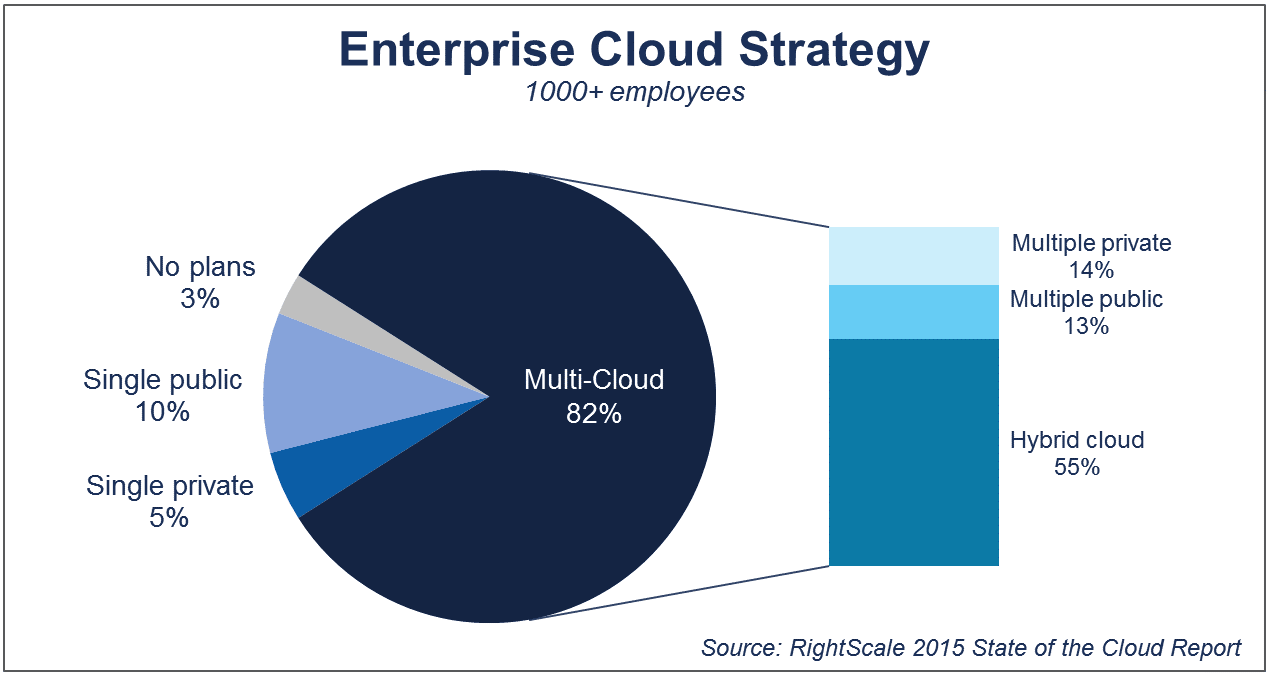Cloud computing has certainly taken a step ahead from whiteboards and the to-do-list of many IT corporates and has slipped into their production environments, fueling new revenue-driving infrastructure and business applications.
For any enterprise which is juggling issues with in-house IT management, support, agility and cost reductions, the cloud is the best platform.
But the question here is… Is one cloud service enough for all the needs of an enterprise? Or, what should organizations go for – single cloud Vs multi-cloud?
For a team which is using the cloud for exchanging complex data and working together on workloads has very different needs than a group that desires the processing power of the Cloud for big data projects. Still, others can be there who want their cloud services optimized for products like office 365 or maybe exchanged. Phew!
What such an organization need is – multi-cloud computing.
A multi-cloud helps an enterprise to target each cloud offering for filling its different needs.
Benefits of Multi-cloud
A multi cloud provides a mix of several other cloud services, for example a multi-cloud can comprise more than one public IaaS, a private PaaS, on-demand scalability from public cloud hosting and security and control from private cloud hosting. It’s more complex than a hybrid cloud, which is simply a combination of private and public cloud.
The growing demands of business is the driving force behind the introduction of multi cloud computing structure. It is being adopted by various enterprises to meet their dynamic needs, but the preference is that one cloud service provider should be able to provide and manage cloud services from different vendors.
Respondents from a research on multi-cloud understood the importance of having different cloud services, but they were not at all willing to deal with the hassles of juggling many hosts i.e. a single provider should be able to offer hosting for all vendors used by the client.

Rightscale 2016 State of the cloud report shows that 82 % of the enterprise are using multi cloud model of cloud computing.
So now you must be thinking, “Is multi-cloud strategy the best fit for my organization? “
The suitability of multi cloud depends upon the “things you need and the things it can offer”. Let’s find out some major benefits of adopting a multi cloud model.
-
Cost reduction
When the maximum percentage of IT budgets are consumed in just keeping the light on, most required today is cost optimizing solutions. It would be like cherry on the top if you associate with a cloud provider who is offering multi cloud solutions, so instead of running from post to pillars you can customize your IT requirements at one place by getting proper guidance from your vendor.
-
Hybridity
Multi cloud allows you to keep some applications on premise and others on more than one public cloud. You can analyze variety of consideration like security, cost optimization and performance of each cloud service provider. For example, you can choose to adopt infrastructure as a service model from more than one service provider that will help you in securing data backup and recovery solutions.
-
Compare different packages and service offered
With multi cloud, you get an opportunity to choose or compare services of different cloud providers. Different cloud providers provision different platforms and propose dynamic packages of capabilities. What Microsoft Azure offers in its cloud can be very different from what’s on offer in AWS. Hence, as a good customer you should also weigh the suitability of each cloud and select according to your business needs.
-
Easy migration between clouds
By adopting a multi cloud approach from a single vendor who deals in all cloud services, you can easily migrate your applications and data across clouds as and when required and that too by optimizing cost. The reasons for such migration can be:
-
Dissatisfaction from the current cloud service.
-
Better packages offered by some other cloud service provider.
-
Changing needs of the businesses.
-
-
Risk Management
Diversification of Risk is considered as one of the best approaches to mitigate the risk. In the multi cloud, by hosting your applications on different cloud platforms you can reduce the chances of complete application failover at the time of any service outage.
So what if multi-cloud data strategy is the future of your organization?
If multi-cloud option is what your organization needs at present, then it’s time to look at cloud solutions by ZNetLive. With us, you get multiple cloud solutions from all the who’s who in the cloud industry- Microsoft, Amazon Web Services, Google Compute Engine, SoftLayer, DigitalOcean, just to name a few. While we provide, devise, manage and handle the complexities of your multi-cloud solution, you can manage your apps whether e-commerce, CMS, middleware, database or more.
Our multi-cloud strategy gives you the freedom to select your favorite data services from your one stop multi-cloud provider: ZNetLive, in order to create a customized solution that best answers your organizational needs.
The above-mentioned benefits of multi-cloud deployment model guide you towards understanding the benefits of multi cloud and its scope in the future market.
Services ZNetLive offer:


